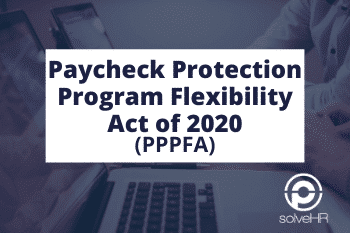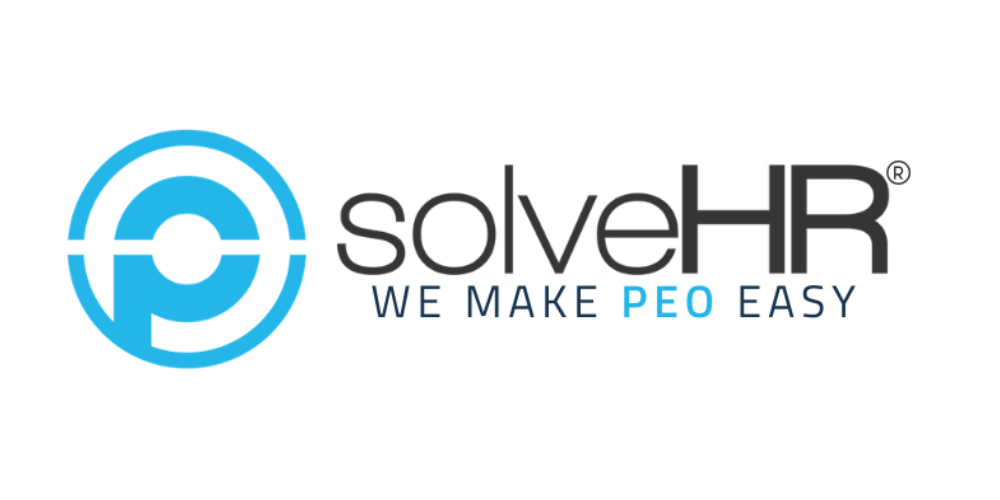- 06/10/2020
- Posted by: SolveHR-IT
- Category: Uncategorized

Last Friday H.R. 7010, the Paycheck Protection Program Flexibility Act (PPPFA), was signed into law. The law dramatically alters and extends several of the key terms of the original Paycheck Protection Program (PPP) that was established by the Coronavirus Aid, Relief, and Economic Security (CARES) Act in March of 2020.
Paycheck Protection Program
The PPP created a new loan program that was run through the Small Business Administration (SBA) to put nearly $600 billion into the hands of small businesses and nonprofit organizations for use in payroll, rent, utilities, and other specific costs. The PPP loans could be 100% forgivable as long as employers maintained similar employment and wage levels over an eight-week period.
The loans were designed to be interest-free emergency aid to keep small businesses solvent during the coronavirus pandemic. As of May 30th, the SBA reported that they had issued more than 4.4 million PPP loans since April 3, with $510 billion being disbursed.
PPPFA Changes
The new changes that the PPPFA brings much-needed relief for borrowers as they seek forgiveness for their loan amounts. The act extends the coverage period to December 31, 2020 and gives employers 24 weeks instead of eight to spends PPP funds. The original eight week period does remain as an option for businesses who spent all of their proceeds and qualify for full forgiveness and do not want to wait until the end of the year to apply.
The Act also reduces the percentage of the loan that needed to be spent on payroll costs from 75% to 60%, allowing businesses to spend more on rent and utilities.
The original PPP also implemented wage and employment level safe harbors, which permitted employers to avoid a reduction in forgiveness amounts due to a significant decrease in employment and/or wage levels between February 15 and April 26, 2020, as long as the number of employees and wage levels was restored by June 30, 2020. The PPPFA extends this safe harbor deadline from June 30 to December 31, 2020, allowing businesses more time to get their employment and wage levels back to normal.
The PPPFA also clarifies that loan forgiveness will not be reduced based on an inability to rehire employees if the employer can document written offers to rehire employees before February 15, 2020, or an inability to hire similarly qualified employees for unfilled positions by December 31, 2020. Additionally, loan forgiveness will not be reduced for failure to maintain employment levels if the business can provide proof of an inability to return to business activity as existed prior to February 15, 2020.
An additional incentive is that employers can now defer certain payroll taxes even if they received a PPP loan. The incentive allows employers to defer the employer’s 6.2% share of 2020 Social Security tax until the end of 2021 (50%) and 2022 (50%). The PPPFA allows an employer to double-dip, as a borrower of a PPP loan may now also defer all of its 2020 Social Security tax burden into 2021 and 2022, even if the PPP loan is forgiven prior to December 31. 2020.
These are the new changes that the PPPFA has made to the existing PPP, although more changes may be on their way. Several lawmakers have expressed a desire to further make technical changes and clarifications to the PPPFA. As it stands now there are still some confusing portions of the original PPP that have not been answered or clarified with the PPPFA, so expect further revisions in the coming weeks.
SolveHR’s mission has always been to provide meaningful, yet simple HR solutions for our clients. In light of the spread of COVID-19, we will continue to make good on that mission, so you can continue to focus on your business and the communities you serve.
Subscribe to receive all our blogs
Written by: Matthew Muriel
Meet Matthew! Matthew is our content writer and has been working with us for a year. He enjoys working for SolveHR because it allows him to practice his copywriting and allows him to build experience in his fledgling career. Matthew studied at the University of Texas at San Antonio and earned his degree in English with a concentration in Professional Writing. He values learning new processes in the HR industry and then conveying those ideas to the company’s clients. When he isn’t working, he enjoys reading nonfiction, with his favorite book that he recently read being The Gene by Siddhartha Mukherjee. If he could go anywhere in the world he would travel across the United States and visit all of the national parks.


Superbe blog, qui transpire la passion à l’état pur … Micky Delaney Orran
Encantada de que hayas disfrutado el artículo